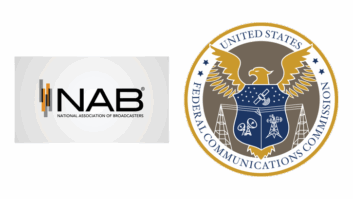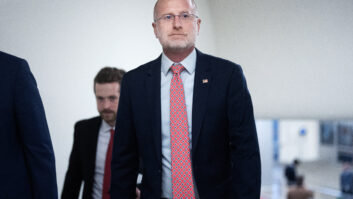FCC Commissioners Nathan Simington and Geoffrey Starks are both leaving the commission at the end of this week.
This leaves the FCC with only Chairman Brendan Carr, a Republican, and Anna Gomez, a Democrat. The commission normally has five members.
Republican Olivia Trusty is awaiting Senate action on her nomination; the timing of today’s announcements may indicate Senate action on Trusty is about to take place. But two more seats would also need to be filled, assuming the Trump administration wants a fully seated commission. The next scheduled commission meeting is June 26.
Simington’s announcement is something of surprise, given that he recently brought on a new chief of staff and had been taking a higher profile in public policy statements, though some FCC watchers had speculated earlier about him leaving. Starks had announced earlier that he would leave this spring.
A supporter of streamlining
In a statement, Simington said, “Throughout my tenure, I worked to defend free expression, safeguard national security and promote infrastructure investment to benefit all Americans. … I remain committed to advancing the cause of limited government, free speech and American innovation.”
“It has been the greatest honor of my professional life to serve the American people as a commissioner. I am deeply honored to have been entrusted with this responsibility by President Donald J. Trump during his first term,” he said.
[Read the Radio World 2022 profile of Simington.]
Simington, 46, was confirmed to the FCC in December of 2020. Among other things he championed AM radio and its important role in public safety. He pointed out broadcast rules that he called antiquated and expressed support for Chairman Brendan Carr’s “Delete, Delete, Delete” initiative.
He was also complimentary of former Chairwoman Jessica Rosenworcel and wasn’t afraid to praise his colleagues for bipartisanship.
“Throughout my tenure, I worked to defend free expression, safeguard national security and promote infrastructure investment to benefit all Americans,” he said in the statement.
Simington says he will remain committed to advancing “the cause of limited government, free speech and American innovation … I look forward to continuing to serve the public interest in the years ahead and to contributing to the vital conversations surrounding our communications infrastructure, national security and technological leadership.”
A native of Saskatchewan, Canada, he had private and public-sector experience prior to joining the commission. He served as senior advisor at the National Telecommunications and Information Administration (NTIA) immediately before joining the FCC. In his role at NTIA, Simington worked on many aspects of telecommunications policy, including spectrum allocation and planning, broadband access, and the U.S. government’s role in the internet.
Prior to joining the NTIA, he was senior counsel to Brightstar Corp., an international mobile device services company. He led and negotiated telecommunications equipment and services transactions with leading providers in over 20 countries, according to his bio. Prior to joining Brightstar, he worked as an attorney in private practice.
Simington is a graduate of the University of Michigan Law School and also holds degrees from the University of Rochester and Lawrence University. He earned a Masters of Music Theory from Eastman School of Music.
Outward bound
Geoffrey Starks was nominated by President Trump to fill a Democratic seat to succeed Mignon Clyburn in 2018. He was confirmed by the Senate in early 2019. Starks was renominated in 2023 by President Biden for a new term that was to run until mid-2027.
Chairman Carr has often voted on the other side of contentious issues, but he has described Starks as a friend as well as a colleague.
Among issues of interest to radio broadcasters, Starks has been a proponent of allowing geotargeting on FM stations using boosters. He favored the return of the orm 395-B to collect employee data from broadcasters, opposed the easing of ownership caps and threw his support behind AM broadcasters in their battle to keep the band in vehicles. He also was vocal about “the persistent lack of diversity in broadcast media ownership, and among its rank and file,” as he said in 2019.
Before becoming commissioner, Starks helped lead the FCC’s Enforcement Bureau, handling a variety of complex investigations, according to his bio. Prior to that he worked in the Department of Justice.







